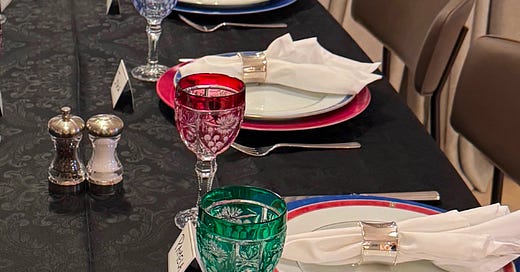Talking Politics at the Holidays Without Ruining Dinner
Political disagreements don’t have to spoil your family gatherings. Even if they're about DEI.
The usual advice for keeping the peace during the holidays is simple: Don’t talk politics. Experts suggest defusing tension by playing with the kids, helping in the kitchen, or changing the subject. After all, as many experts have suggested, nothing you say is likely to change anyone’s mind. So why bother?
My latest article for Psychology Today offers an alternative to the unhappy holiday political rancor, using tools from the Habits of a Free Mind toolkit.
My first article in The Spectator, co-authored with Lee Jussim, a colleague at the Network Contagion Research Institute, summarizes what we found when our NCRI team tested whether certain materials and key themes widely employed in diversity interventions foster inclusivity or exclusion, reduce or increase bias and reduce hostility or increase what’s known in psychology as the ‘hostile attribution bias,’ the tendency to perceive hostility or harm where none exists.
We found that participants exposed to anti-oppression narratives perceived more prejudice in interactions where none empirically existed than participants exposed to neutral narratives. As we wrote in The Spectator, “For example, in one scenario involving a college admissions rejection, participants who read anti-racist materials perceived that the admissions officer had acted with 21 percent more racial bias even though the scenario included no evidence of bias — nor even information about race.”
This is not surprising. The fundamental premise underlying the Diversity, Equity, and Inclusion (DEI) paradigm is that racism is the norm; that it is present everywhere and all the time. The question is not whether there was racism in a given scenario, but how racism presented itself.
We also found that those exposed to DEI content were significantly more likely to endorse punishing the alleged perpetrators of bias. For example, in the admissions scenario, they were more willing to demand a public apology, suspend the admissions officer, and require additional DEI training.
The demand for additional DEI training as a consequence for nonexistent discrimination sounds all too familiar to the falsely accused who have been unnecessarily required to undergo some form of anti-bias training.
And yet, if you find yourself disagreeing with people about DEI over the holidays, you can use the tools from the Habits of a Free Mind Toolkit (found in the article above) to listen with genuine curiosity, and have a happier holiday than the kind that political rancor creates.
As the New Year approaches, we can hope — and work toward — a new era of “intellectual pluralism,” to use a term coined by Pano Kanelos, founder of the University of Austin.
Happy New Year!
More to come… (next year)





Great advice for engaging with family at gatherings. I would have read article earlier, but was busy shopping for a new witch-broom. Thank you.